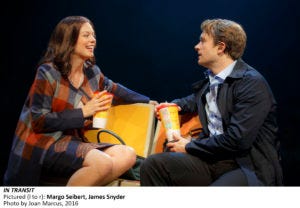ECONOMICAL 'IN TRANSIT' SEEKS BOOST FROM CLINTON ENDORSEMENT

In Transit, the low-grossing new musical that Bill and Hillary Clinton saw Wednesday night, is losing less money than you might think.
As Broadway's first a cappella musical, it doesn't employ musicians, besides 11 hardworking onstage actor-vocalists, including one who does percussion. (Steven "HeaveN" Cantor and Chesney Snow alternate in the role of "Boxman.")
According to a budget filed over the summer with the office of New York Attorney General Eric Schneiderman, to pay expenses the production needs minimum weekly sales of $439,000. (The figure includes credit card commissions and other extras that count toward Broadway League official grosses.) Lead producer Janet Rosen said in an interview that because the show was budgeted conservatively, actual breakeven is below $400,000. Sales last week were $338,000.
Its operating loss had been higher. In Transit is the only Broadway show that saw sales rise in four of the past five weeks.
Many performances are sold-out -- but remain heavily discounted. Attendance at Circle in the Square was 91 percent of capacity last week, while the gross was below 50 percent capacity.
Capitalized at just under $7 million and set largely in the subway, the production faces a familiar quandary. How long should producers wait for operating profits to materialize before calling it quits? For every Gentleman's Guide to Love & Murder, which weathered a punishing winter before winning the Tony Award for best musical in 2014, countless other slow-starters don't break through. In Transit got the cold shoulder from Ben Brantley, but was championed by Variety, NBC and New Jersey's Star-Ledger.
"We have tremendous word of mouth," Rosen said. "The audience loves the music and relates to the story."
Added co-producer David Garfinkle: "It definitely has momentum."
In Transit's operating costs are unheard-of for a musical, and even lower than many plays. That gives it some breathing room. Rosen said the musical hasn't had to take a priority loan to stay afloat. She and her co-producer husband, Marvin Rosen, a lawyer and former finance chairman of the Democratic National Committee, invited the Clintons. Janet Rosen sat to Bill Clinton's right. "He leaned over and said, 'the cast is wonderful,'" she recalled. In a tweet Thursday afternoon, the former president praised it as "a moving, creative story of different lives coming together."
At Saturday's matinee, which we attended, the audience seemed appreciative of the tuneful songs, multipart harmonies and jokes about the subway's quirks, including the often-inaudible public address system and testy attendants. The storylines had added punch due to the White House's rightward lurch, like slices of life from a sanctuary city.
Margo Siebert, who plays a struggling actress in the show, said at BroadwayCon last weekend that performers were concerned that the plot about a gay talent agent hiding his marriage from his conservative family back home was "old news." "But it isn't old news now," she said. (Some of the characters are loosely based on the writers when they began working on an earlier incarnation of the show in 2000. They are James-Allen Ford, Sara Wordsworth, Russ Kaplan and Kristen Anderson-Lopez.)
Train traffic ahead may be In Transit's biggest challenge. Another eleven Broadway musicals are scheduled to open through April, as part of the busiest season for musicals since 1980-81, when the subway fare was 60 cents. "We can only do what we can do," said Rosen, a first-time lead producer and low-key grandmother of seven. "We're hoping the word spreads."


